House votes for voter ID bill
by January 31, 2017 6:15 pm 274 views

The Arkansas House of Representatives voted 74-21 Tuesday (Jan. 31) to advance a bill requiring voters to present a photo identification when voting.
House Bill 1047 by Rep. Mark Lowery, R-Maumelle, now goes to the Senate.
The Legislature in 2013 passed Act 595, which also required voters to present a photo identification at the polls, but it was struck down by the Arkansas Supreme Court. The late Justice Donald Corbin wrote in his majority opinion that the measure added a qualification to voters that is not included in the Constitution. Justices Courtney Goodson, Karen Baker and Jo Hart, all of whom are still on the seven-member court, offered a concurring opinion based on the fact that the amendment was not passed with a two-thirds majority. They did not rule on the qualification issue.
Lowery argued that the bill was written to withstand constitutional scrutiny by focusing strictly on voter registration. He said it expanded the number of valid IDs that can be presented at the voting booth, including a driver’s license, passport, employee badge and others. Voters who do not have IDs will be provided free ones.
Rep. Clarke Tucker, D-Little Rock, said the bill likely would be struck down by the courts. The 2013 decision was unanimous, and courts will follow the precedent, he said. Four justices said it added a qualification for voting. The three concurring justices simply didn’t rule on that issue, he argued.
Tucker said that when the previous voter ID law was in place during the 2014 primary elections, 1,200 voters were turned away from the polls because they did not have a photo I.D. with them.
“What we’re talking about here is the right to vote,” he said. “It is essentially the most sacred right in a democracy.”
Lowery said that many question if a voter ID law is needed. He said there is only anecdotal evidence of widespread voter fraud because there is no centralized clearinghouse for data collection and because prosecuting attorneys focus on other issues. The bigger issue, he said, is a lack of confidence in the accuracy of voting. He said many Americans are not confident voting results will be accurate.
“There’s your problem, folks, that any time there is a lack of confidence in one of our main institutions, which is the ability to vote, and it’s undermined, it also has the impact of undermining democracy,” he said.
Lowery said a 2016 Gallup poll showed 80% of Americans support voter ID laws, with similar support among white and nonwhite voters. He said identification is required for many activities of daily life, including driving, boarding a plane and picking up a prescription.
Before voting for the bill, the House voted to suspend the rules after Rep. Charles Blake, D-Little Rock, argued that it lacked a fiscal impact statement. Blake told the House Rules Committee that county officials had said the bill would require an expenditure of public funds.
Lowery said that a fiscal impact statement is not necessary because the equipment to produce the IDs was purchased by the secretary of state after the 2013 law. After the Supreme Court decision, he said the equipment was collected and can be redistributed to counties. On Jan. 25, Danielle Fusco, spokesperson for the secretary of state’s office, said not every county was able to account for all the working pieces, so some of the sets are not in working order.
